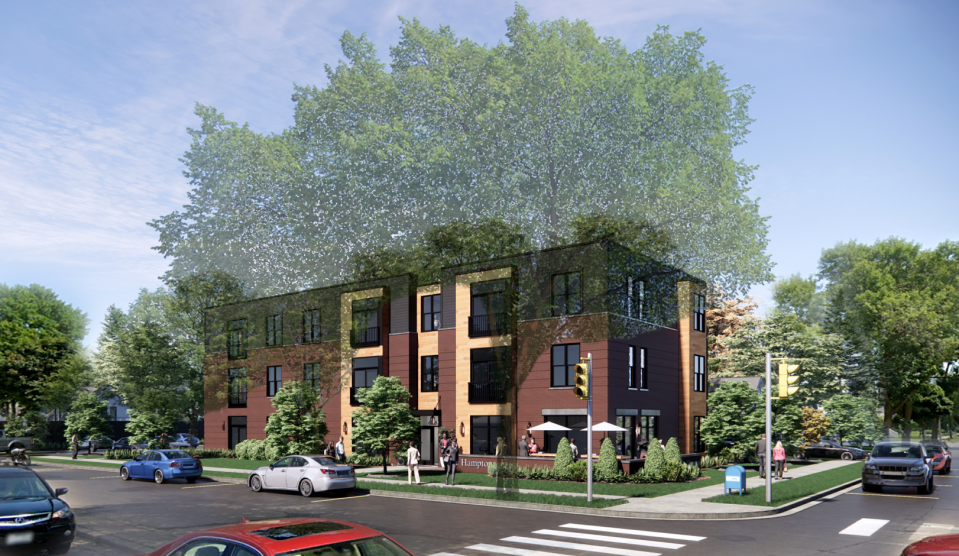A developer has appealed the rejection of an affordable apartment project in Whitefish Bay
A Whitefish Bay commission halted plans for a proposed affordable apartment building in December, but the developer and supporters of making the village a more affordable place to live haven't abandoned it yet.
Developer Brian Spoerl is appealing the Architectural Review Commission's December decision to reject the planned 17-unit development known as The Hampton that would have been the village's first publicly financed affordable apartment development.
Plans for the three-story proposal at the intersection of North Santa Monica Boulevard and East Hampton Road (at 4800 - 4818 N. Santa Monica Blvd.) were stymied on Dec. 21. The commission voted 4-2 to reject the project, saying it "still didn't feel like Whitefish Bay," and that the proposed parking lot could negatively impact the values of surrounding property, according to minutes from the meeting.
It wasn't the first time the commission rejected Spoerl's plans. Since June 2023, the village has sent back several of Spoerl's proposals for the corner, most an iteration of his initial pitch with luxury apartments and first-floor retail.
But in mid-December, Spoerl obtained federal grant funding through Milwaukee County to help finance an affordable version of the development, which would cost $5.9 million. The county board agreed to give Spoerl $2,855,759 in American Rescue Plan Act funds and $232,329 through the HOME Investment Partnerships Program.
Over the past few years, the county has sought to increase the supply of affordable housing in the suburbs. Whitefish Bay’s 2019 comprehensive plan also calls for an increase in affordable housing and a better utilization of the corner of Santa Monica Boulevard and Hampton Road.
Neighbors who have opposed the development since it was first pitched have argued Spoerl's affordable proposal has all the same issues as the initial luxury apartments. They've said it could negatively impact their home values and add more traffic to an already dense area of the village.
But in the weeks since the proposal was rejected, other residents who hope to broaden the village's housing supply have organized to support the project.
At its Feb. 13 meeting, the village's Board of Appeals will either accept Spoerl's appeal, reject it, or send it back to the Architectural Review Commission. The meeting will include a public comment section, but it will take place after the board votes on Spoerl's appeal.

What does the appeal say?
Commissioners had said the development's parking lot would negatively affect neighboring property values, according to a report written after the December meeting justifying the rejection, which Spoerl attached to his appeal. The ARC also said architecture on the north side of the proposed development was "cold – not residential feeling," and the design "still doesn't feel like Whitefish Bay."
Spoerl depicted the commission's comments as elusive and subjective.
"There is no clear cut sense of what it means to 'feel like Whitefish Bay,'" he wrote, comparing his designs with other mixed-use and multifamily developments near single-family neighborhoods — including another rental complex at 600 E. Henry Clay St. the village approved last year.
Spoerl's updated plans for the development include new colors and materials similar to the Henry Clay development and a fence and shrubbery along the north line of the property to provide a buffer from the parking lot.
In his appeal, Spoerl argued that none of the aforementioned issues violated village zoning regulations. As all projects that reach the commission are, the proposal was approved by the village's Building Services Department, which reviews objectively on whether proposals follow zoning ordinances.

What does it mean to 'feel like Whitefish Bay?'
The Architectural Review Commission's feedback, however vague, is consistent with village ordinances that outline the commission's purpose and procedures.
According to the village code, the commission is charged with maintaining "the perpetuation of village character and atmosphere" and preserving property values.
The ordinance that specifically applies to the commission's review of developments like Spoerl's says proposals must be in "harmony with the general character" of a neighborhood and not "cause material depreciation generally to property in said neighborhood."
Throughout the commission's various meetings, Village Attorney Chris Jaekels has read this section into the record to help calibrate the commission's discussion to the standards that apply.
“That’s a really old standard,” Jaekels told commissioners Feb. 1 during a presentation on the commission's responsibilities and authority. “That’s left from when we created the design guidelines. That’s the standard in Milwaukee, applied in most suburbs forever."

Even the commissioners expressed dismay at the standard's vagueness. One commissioner said that while they're not opposed to seeing more projects like Spoerl's, “it's really hard floating in these standard-less standards.”
This type of language isn't unique to Whitefish Bay's Architectural Review Commission.
For instance, Shorewood's Design Review Board, as described in village ordinances, has an established purpose to "perpetuate and further the character of Shorewood," but also includes goals to "promote the public health, safety, convenience, prosperity, comfort, and general welfare."
But housing advocates inside and outside of the village argue that an unmistakable consequence of maintaining the "character" of a place, in part designed by redlining and racially restrictive covenants, is that the vestiges of those illegal and discriminatory practices lives on.
"What does it mean to 'feel like' something belongs in a place nicknamed 'Whitefolks Bay?'" Dynasty Caesar wondered after reading an Urban Milwaukee article she read recently, referencing the old nickname for the village. Caesar is a senior campaign organizer for the Redress Movement, a national organization with roots in Milwaukee that focuses on "redressing racial segregation," according to the movement's website.

Homeownership ― one of the primary mechanisms for building wealth in the U.S. ― for Black and Brown people in areas like Whitefish Bay was prohibited by housing covenants and restricted by zoning laws, Caesar said.
This history is well documented in Richard Rothstein’s 2017 book, "The Color of Law: A Forgotten History of How Our Government Segregated America," which examines the way discriminatory housing practices and policies influenced the formation of segregated cities and inspired the Redress Movement to form in 2022.
On Feb. 8, the organization sent an email penned by Caesar to its base, encouraging supporters to write letters to village officials and the commissioners. "The Board of Appeals has a chance to finally change this history," she wrote.
While Caesar doesn't live in Whitefish Bay, she is heavily involved in the county's efforts to expand affordable housing, and she is invested in the fate of The Hampton.
"This long history of discriminatory housing practices has left our county incredibly segregated with a dire need for more housing and more affordable housing," she said in an interview with the Journal Sentinel.
"Whitefish Bay's code offers enough subjectivity to reject a development that otherwise satisfies all the zoning requirements," Caesar said.
Whitefish Bay's Lead Building Inspector Joel Oestreich said while the concept of design and aesthetic analysis according to the "harmony" standard and "perpetuating village character" can be vague and interpretive, it is still enshrined into village law.
Proposal sparks debate on property values
Commissioners and neighbors opposed to the proposal also argued the development would negatively affect surrounding property values, but Spoerl said neither provided evidence that was true.
Spoerl said the corner he hopes to redevelop has sat vacant for years and that his plans would add value to the area by taking "a forlorn and vacant corner at a gateway to the village" and giving it "a brighter, more functional look."
In his appeal, Spoerl referred to the village's comprehensive plan, which outlines the need to reverse the 19% population decline in Whitefish Bay between 1970 and 2017.
At the Feb. 1 meeting, Jaekels told the commission that, "if somebody's spending a couple hundred thousand dollars right next to you, even if it's ugly and you hate it, your property value's going up."
He said it's why the commission can't rely on the property value standard and needs the "harmony" standard.
"If everything were objective and mathematical, we wouldn't even need an ARC (Architectural Review Commission)," Jaekels said in an interview with the Journal Sentinel.
Proposal would involve demolition of apartment building and house
Spoerl's proposal would revitalize a vacant office building. Still, it would also raze a four-unit apartment building and a single-family homenorth of the office that a family just moved into.
Brandi Hammond and Tim Wilson moved their family into the single-family home at 4818 N. Santa Monica Blvd. with no idea their home was being considered for demolition.
On Oct. 1 of 2023, they packed up their things, prepared their children for new schools and moved their lives into their new home. They found out about The Hampton proposal from a neighbor after moving in.
The couple attempted to contact their landlord but were only able to communicate with the property management company Citywide Rentals. They were told the company had no paperwork indicating the owner would sell.
According to the village assessor’s website, the buildings are owned by three different business entities, with either Arnold Siegert or Christopher Meisel as the registered agents. However, Spoerl has a sale and purchase agreement with the owners, pending his proposal's approval.
Siegert and Meisel could not be reached for comment.
When asked why Hammond and Wilson weren't notified and whether they had any record of the agreement, a Citywide Rentals spokesperson said, "No comment."
At commission meetings, the couple expressed frustration with the village and the owner for not informing them of plans to potentially raze the property.
"We've shelled out so much money to get here," Wilson said. "We're not even owners. We're renters, and it's not easy to move these days. We're going to need an ample amount of time. And we're so left in the dark, we don't know what to do," he said.
Hammond and Wilson could afford Spoerl's one-bedroom units, but because they're a family of five, they wouldn't be able to live there.
How much affordable rental housing does Whitefish Bay have now?
The village currently has 897 rental units, and a quarter of them are considered as affordable as The Hampton, with rents under $1,250, said Village President Kevin Buckley.
The apartment and home that would be razed are currently rented to five households at a rate that would be considered affordable to the village, he said.

Spoerl's development proposal contains 17 units, but by razing five, the net total of affordable units added would be 12.
The Hampton's monthly rents would range from $1,000 to $1,250, according to a county board report. A $1,250 monthly rent is considered affordable for families earning Milwaukee County's annual median income of $50,000.
What is the community saying?
Since the December rejection, discourse on both the development and on affordable housing in the suburbs has ignited, said Anne O'Connor, Whitefish Bay resident of 16 years and co-founder of the nonprofit community advocacy organization Bay Bridge Wisconsin.
O'Connor is also currently running for Liz Sumner's Milwaukee County Board supervisor's seat, which Sumner plans to vacate in 2024.
Because Whitefish Bay is already densely built out with fewer opportunities for redevelopment than other suburbs, the village has not always had to include itself in broader discussions around the shortage of affordable housing in the region, O'Connor said.

In a Jan. 25 press release, Bay Bridge Wisconsin — a group that focuses on "raising awareness of racial and cultural bias in our community" — released a statement encouraging residents to write letters to village officials expressing support for more housing solutions.
"Whitefish Bay has an opportunity to more closely assess our existing systems and inventory of housing at all different levels and see where we could possibly add more," O'Connor wrote.
As a model, the group highlighted other communities' efforts to alleviate the housing shortage through rezoning, safeguarding affordability in perpetuity, adding accessory dwelling units, and establishing land trusts.
Another village organization WFB Safe, which focuses on bike and pedestrian safety, published a statement in support of the project. Village officials like Buckley and Trustee Raisa Koltun have also publicly supported the development on social media.
However, neighbors who are opposed have also continued to voice their concerns.
Kristin Schiestle, another neighbor down the street from the site, said their area is already one of the most dense and affordable places to live in the village and worries about pedestrian safety due to the increased traffic 12 additional units would add.
According to Whitefish Bay Police Chief Patrick Whitaker, the corner, which he called a "thoroughfare between Milwaukee, Whitefish Bay and Shorewood," saw more accidents than any other intersection in the village between January 2017 and July 2023 ― a total of 16.
O'Connor said regardless of what happens with the development, the increased attention to traffic at the corner could be a mixed blessing if the village decides to take action and make it safer.
Schiestle wishes Spoerl had worked with residents like her, Hammond and Wilson throughout the process.
She said the neighborhood was blindsided by the news that Spoerl had changed course with plans to propose a three-story affordable development with already-secured county funding after he'd received several rejections for the luxury apartments and retail proposal.
"Neighborhood resistance began long before the development changed direction and had nothing to do with the affordable aspect of the proposal," Schiestle said. From the onset, she said concerns involved, "the potential decrease to adjacent property values, loss of privacy, increased density in an already busy area, parking and alley issues, and community safety concerns."
O'Connor believes neighbors have valid questions and concerns about the development but said that, in effect, they still amount to barriers preventing the village from creating more housing.
"We need to more closely examine the forces at work here and try and get something that works for everybody," she said. "Instead of worrying about whether we look bad, let’s look for solutions."
Editor's note, 2/14/24: A previous version of this story did not include necessary context for a quote from Dynasty Caesar.
Contact Claudia Levens at clevens@gannett.com. Follow her on X at @levensc13.
This article originally appeared on Milwaukee Journal Sentinel: Whitefish Bay apartment proposal at crux of affordable housing debate

